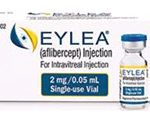
The U.S. Food and Drug Administration on March, 2015 approved the use of Eylea, an injected drug, to treat diabetic retinopathy in patients with diabetic macular edema.
According to the U.S. Centers for Disease Control and Prevention, diabetic retinopathy is a leading cause of blindness in American adults. A third of those over 40 with diabetes have some form of the eye condition, according to 2008 data, the CDC said.
Overall, more than 29 million people in the United States have type 1 or type 2 diabetes, and diabetes remains the leading cause of new blindness among people aged 20 to 74, the CDC noted.
In some people who have diabetic retinopathy with macular edema, abnormal new blood vessels grow on the surface of the retina. If those new blood vessels break, severe vision loss or blindness can occur.
“The major cause of vision loss occurs when abnormal blood vessels leak, causing retinal swelling also known as macular edema,” explained Dr. Mark Fromer, an ophthalmologist at Lenox Hill Hospital in New York City.
“Today’s approval [of Eylea] gives patients with diabetic retinopathy and diabetic macular edema another therapy to treat this vision-impairing complication,” Dr. Edward Cox, director of the Office of Antimicrobial Products in the FDA’s Center for Drug Evaluation and Research, said in an agency news release.
Eylea is given by a doctor as an injection into the eye once a month for the first five injections, and then once every two months. It is meant to be used along with measures to control a patients’ blood sugar, blood pressure and cholesterol levels, the FDA said.
The approval is based on the findings from two clinical trials that included a total of 679 diabetic retinopathy patients with diabetic macular edema. They were randomly assigned to receive Eylea or macular laser photocoagulation, a laser treatment that burns small areas of the retina.
After 100 weeks, patients taking Eylea had significant improvement in the severity of their diabetic retinopathy, compared with those who did not receive the drug, the FDA said.
Another expert said that Eylea is just one of a number of recent advances against the disease. For example, in February, the FDA approved Lucentis (ranibizumab) injections to treat diabetic retinopathy in patients with diabetic macular edema.
In the last few years, multiple new medications and various surgical methods have become available to treat diabetic retinopathy.
Approved injected medications, frequently improve vision in the effected diabetics and timely treatment can prevent blindness. However, it is important that new medical and surgical treatments be administered by a retina specialist, as close monitoring is required with all of these new treatments.
According to the FDA, common side effects with Eylea included bleeding into the tissue that lines the inside of the eyelids and covers the white part of the eyes, eye pain, cataracts, floaters, increased pressure inside the eye, and separation of the interior jelly of the eye from the retina. Serious side effects included infection within the eye and retinal detachment.
Eylea, marketed by Regeneron Pharmaceuticals Inc. in Tarrytown, N.Y., is also approved to treat wet age-related macular degeneration, as well as diabetic macular edema and macular edema secondary to retinal vein occlusions, the FDA said.
Schedule Your Appointment Today
* All indicated fields must be completed. Please include non-medical questions and correspondence only.


